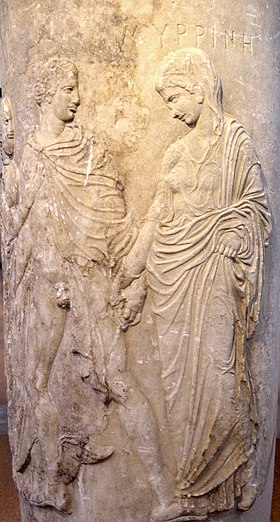Psychopomp
From Wikipedia, the free encyclopedia

Many religions include a particular spirit, angel, or deity whose responsibility is to escort newly-deceased souls to the afterlife. These creatures are called psychopomps, from the Greek word ψυχοπομπός (psychopompos), literally meaning the "guide of souls". Their role is not to judge the deceased, but simply provide safe passage. Frequently depicted on funerary art, psychopomps have been associated at different times and in different cultures with horses, whippoorwills, ravens, dogs, crows, owls, sparrows, cuckoos, harts, and dolphins.
In Jungian psychology, the psychopomp is a mediator between the unconscious and conscious realms. It is symbolically personified in dreams as a wise man (or woman), or sometimes as a helpful animal. In many cultures, the shaman also fulfills the role of the psychopomp. This may include not only accompanying the soul of the dead, but also vice versa: to help at birth, to introduce the newborn's soul to the world (p. 36 of [1]). This also accounts for the contemporary title of "midwife to the dying," which is another form of psychopomp work.
[edit] List by mythology or belief system
| This article may contain original research or unverified claims. Please improve the article by adding references. See the talk page for details. (September 2007) |
| This section does not cite any references or sources. Please help improve this article by adding citations to reliable sources (ideally, using inline citations). Unsourced material may be challenged and removed. (August 2006) |
[edit] African
[edit] Aztec
[edit] Celtic
[edit] Christianity
- Angels
- St. Michael (an archangel)
- St. Peter (a saint)
[edit] Egyptian
[edit] Etruscan
[edit] Greek
[edit] Hinduism
[edit] Inuit
[edit] Islam
[edit] Japanese
[edit] Judaism
- Abraham
- St. Gabriel (an archangel)
- Lailah
- Elijah/Sandalphon (an archangel)
[edit] Korean
- Jusung Saja
[edit] Mayan
[edit] Mesopotamian
[edit] Native American
[edit] Norse
[edit] Persian
[edit] Polynesian
[edit] Roman
[edit] Slavic
[edit] Vodun
[edit] Zoroastrianism
[edit] Other
[edit] Fiction
Compare Virgil's role in Dante’s Inferno.
George Lass and the other reapers on the Showtime series Dead Like Me are more accurately described as psychopomps, as they do not actually kill people but instead remove their souls moments before death and escort them to the afterlife.
The Reapers of the TV series Supernatural act as psychopomps.
In the TV series Reaper, the character Sam Oliver acts as a psychopomp, capturing and returning escaped souls to Hell on behalf of the devil.
In modern literature, the title character of J. M. Barrie’s Peter Pan is said to act as a guide for children: “At first Mrs. Darling did not know, but after thinking back into her childhood she just remembered a Peter Pan who was said to live with the fairies. There were odd stories about him; as that when children died he went part of the way with them, so that they should not be frightened.”
Whipporwills feature prominently as malign psychopomps in many works of H. P. Lovecraft, perhaps most notably in The Dunwich Horror.
Sparrows as psychopomps play a notable role in Stephen King's novel The Dark Half.
The Soul Reapers of the Bleach franchise act as psychopomps.
In the anime and manga YuYu Hakusho, Botan acts as a psychopomp as the ferrywoman of the Sanzu River, guiding souls to the afterlife (most notably Yusuke Urameshi).
In Northern Lights Yambe Akka serves as a guide to dead or dying witches, taking them peacefully to the underworld.
Enma Ai of the anime series Jigoku Shoujo acts as a psychopomp, ferrying grudged-upon souls to Hell.
Death is one of many psychopomp characters in Neil Gaiman's Sandman comics. Lucifer Morningstar is another psychopomp and refers to himself as one when he kills the Shiko-Mi demon in the second story arc.
In the LucasArts game Grim Fandango, the player plays as a "travel agent" (psychopomp) named Manny Calavera, guiding people from the Land of the Dead safely to the afterlife.
At the end of Pirates of the Caribbean: At World's End, Will Turner becomes a psychopomp by becoming the captain of the Flying Dutchman in order to guide the souls of men who died at sea to the land of the dead, a job previously tasked to but neglected by Davy Jones.
In the final episode of Six Feet Under, Nathanial and Nate Fisher serve as psychopomps for Ruth Fisher, while Keith Charles-Fisher serves as one for his husband, David.
In the DC comics universe, speedsters are led to the afterlife (or in this case, Speed Force) by a psychopomp known as the Black Flash.
Piers Anthony's Incarnations of Immortality series is inaugurated by On a Pale Horse, which introduces protagonist Zane, who inadvertently assumes the immortal role of psychopomp, Thanatos, through a confluence of circumstances surrounding a noncommittal suicide attempt.
The deities known as "Spirits" in the webcomic The Phoenix Requiem act as psychopomps. The webcomic Gunnerkrigg Court also features a protagonist who can interact with psychopomps.
The 2008 film, The Spirit, features Lorelei, a phantom siren who continually attempts to lure The Spirit into the afterlife with her mesmerizing song.
[edit] See also
[edit] Notes
- ^ Hoppál, Mihály: Sámánok Eurázsiában. Akadémiai Kiadó, Budapest, 2005. ISBN 963-05-8295-3. (The title means “Shamans in Eurasia”, the book is written in Hungarian, but it is published also in German, Estonian and Finnish.) Site of publisher with short description on the book (in Hungarian).
[edit] References and further reading
- Geoffrey Dennis, "Abraham," "Elijah," "Lailah," "Sandalphon," Encyclopedia of Jewish Myth, Magic, and Mysticism Llewellyn, 2007.
- Eliade, Mircea, "Shamanism", 1964, Chapters 6 and 7, "Magical Cures: the Shaman as Psychopomp".
- Psychopomps.org provides additional information about what a psychopomp is, why psychopomps are so important, and how psychopomps have been portrayed in the myths and sacred stories of different cultures around the world.



